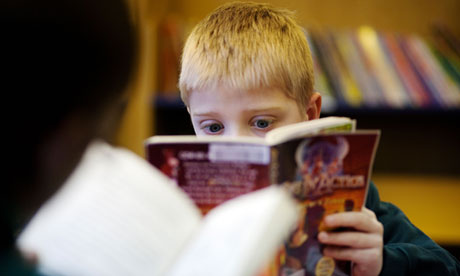Clutch of writers blames internet and lack of libraries for slide, which they say risks depriving children of vital reading material

A boy reading in his school library. The authors argue that not all children want to read fiction all the time. Photograph: Alamy
A group of authors has sounded a warning over the decline of non-fiction for children, calling on publishers and libraries to reverse the slide or risk depriving children – particularly boys – of vital reading material.
Led by the prolific children's non-fiction writer Jenny Vaughan, the 26 authors have written to the Guardian in an attempt to save a genre they believe is in terminal decline.
"We got to the end of our collective tethers," Vaughan said. "We thought that something had to be done – that we've got to start making a noise about this before children's non-fiction is obsolete."
In the letter the authors argue that "once, there were hundreds of such books available, covering every topic imaginable – but, almost overnight, it seems, the market for them has almost vanished. Not, we think, because children don't want to know about the real world.
"It's partly because of the dearth, or even death, of school and public libraries. And then there's the belief that the internet provides all the information anyone needs."
Official figures from Nielsen BookScan show that sales for children's non-fiction fell to £41.1m by mid-August, down 9% on five years ago. The majority of this is made up of sales of study guides – worth £22.6m – with the range of TV tie-in books on the Moshi Monsters taking the top five chart slots and making £2.2m over the period, up 35% on last year.
Caroline Horn, children's literature expert and editor of the children's books resource Reading Zone, agreed that children's non-fiction had declined significantly in recent years.
"Publishers have cut back, partly because of people like Waterstones completely cutting back on non-fiction about six or seven years ago. It started then and it's got progressively worse as the internet has become more powerful," she said.
"Without these character/TV-based books [such as Moshi Monsters], there would be an enormous slide in non-fiction sales – what we see as traditional reference books, encyclopaedias, topic books etc – which is very dispiriting for authors and publishers, and damaging for the children and young people who need it to help develop them as readers."
Full story at The Guardian
Led by the prolific children's non-fiction writer Jenny Vaughan, the 26 authors have written to the Guardian in an attempt to save a genre they believe is in terminal decline.
"We got to the end of our collective tethers," Vaughan said. "We thought that something had to be done – that we've got to start making a noise about this before children's non-fiction is obsolete."
In the letter the authors argue that "once, there were hundreds of such books available, covering every topic imaginable – but, almost overnight, it seems, the market for them has almost vanished. Not, we think, because children don't want to know about the real world.
"It's partly because of the dearth, or even death, of school and public libraries. And then there's the belief that the internet provides all the information anyone needs."
Official figures from Nielsen BookScan show that sales for children's non-fiction fell to £41.1m by mid-August, down 9% on five years ago. The majority of this is made up of sales of study guides – worth £22.6m – with the range of TV tie-in books on the Moshi Monsters taking the top five chart slots and making £2.2m over the period, up 35% on last year.
Caroline Horn, children's literature expert and editor of the children's books resource Reading Zone, agreed that children's non-fiction had declined significantly in recent years.
"Publishers have cut back, partly because of people like Waterstones completely cutting back on non-fiction about six or seven years ago. It started then and it's got progressively worse as the internet has become more powerful," she said.
"Without these character/TV-based books [such as Moshi Monsters], there would be an enormous slide in non-fiction sales – what we see as traditional reference books, encyclopaedias, topic books etc – which is very dispiriting for authors and publishers, and damaging for the children and young people who need it to help develop them as readers."
Full story at The Guardian
No comments:
Post a Comment